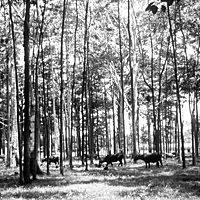


Expert malaisien de haut niveau en foresterie du Forest Research Institute of Malaysia, M. Sim Hoek Choh, a effectué une mission au Pérou pour aider ce pays à trouver de nouveaux moyens d'améliorer la productivité dans l'industrie du bois. Cette mission est un intéressant exemple de coopération technique interrégionale entre pays en développement.
Cet expert a passé six jours dans les provinces d'Amazonie, où sont concentrées les grandes industries péruviennes. M. Hoek Choh s'est rendu dans des scieries et des instituts de recherche ainsi que dans plusieurs universités, dont la faculté de foresterie de l'Université de Puerto Almendras
En un interesante ejemplo de cooperación técnica transregional entre países en desarrollo, el experto forestal malasio Sim Hoek Choh viajó al Perú para asesorar a su Gobierno sobre métodos alternativos de incrementar la productividad de la industria maderera del país.
El experto superior del Instituto de Investigaciones Forestales de Malasia pasó seis meses en las provincias amazonas, donde están concentradas las principales industrias peruanas. Visitó en ellas fábricas locales de madera y centros de investigación, así como varias universidades, entre ellas la Facultad Forestal de la Universidad de Puerto Almendras.
![]()
In an interesting example of cross-regional technical cooperation between developing countries, a senior expert from the Malaysian Forest Research Institute, Sim Hoek Choh, travelled to Peru to advise the government on alternative ways of increasing the productivity of its timber industry. The expert spent six days in the Amazon provinces, where the major Peruvian industries are concentrated, visiting local timber mills and research institutions as well as several universities, including the Forest Faculty of the University of Puerto Almendras.
Despite Peru's vast timber resources, the wood industry is relatively small and is looking for development opportunities. Access to domestic and export markets is constrained by virtually exclusive reliance on river transportation. According to official statistics,  the wood industry currently contributes less than 1 percent to the country's GDP. The industry is still largely concentrated in the primary processing stage, converting logs into commodities such as timber and plywood. Little value is added to the processed raw material, which could be improved by the manufacture of finished or semi-finished products such as furniture components and parquet flooring. A typical example is the production of sawn timber, which is marketed without being kiln dried. The government is encouraging industries to go further downstream and at the same time diversify into other products in order to achieve more efficient utilization of resources. Yet research on and development of wood technology and forest products are hampered by a lack of focus and by generally inadequate facilities.
the wood industry currently contributes less than 1 percent to the country's GDP. The industry is still largely concentrated in the primary processing stage, converting logs into commodities such as timber and plywood. Little value is added to the processed raw material, which could be improved by the manufacture of finished or semi-finished products such as furniture components and parquet flooring. A typical example is the production of sawn timber, which is marketed without being kiln dried. The government is encouraging industries to go further downstream and at the same time diversify into other products in order to achieve more efficient utilization of resources. Yet research on and development of wood technology and forest products are hampered by a lack of focus and by generally inadequate facilities.
Hoek Choh spent the last day of his assignment in Lima, where he briefed the Deputy Minister of Industry, Tourism, Integration and International Trade Negotiations and also met several senior officials of that ministry who had requested FAO's assistance in providing a wood-based industry expert.
On the basis of his discussions with researchers and local industry workers, the expert made a number of recommendations to the Government of Peru: research and development activities will need to be strengthened through more concerted and focused approaches; as the industries move further downstream, in accordance with government policy, the need for technical support will require the stepping up of applied research; and university curricula should be oriented towards producing graduates with practical problem-solving skills. The government will also need to introduce policies to encourage the numerous new small and medium-scale enterprises that are likely to spring up as a result of value-adding activities, such as the production of furniture and furniture components, solid wood doors and flooring. These will provide many essential goods and services and will be crucial to the successful development of Peru's downstream wood industries. Residue reduction and utilization are further areas for improvement that will become increasingly important in the future. Besides reducing pollution, reducing residues improves utilization of resources. For example, some forms of residues are suitable raw materials for panel products which, with the exception of plywood, are not currently manufactured in the Amazon provinces.
New investments to upgrade plant and facilities will improve the overall productivity of the industry but, in order to attract these, the government will need to invest heavily in the area's underdeveloped transport and communications infrastructures.